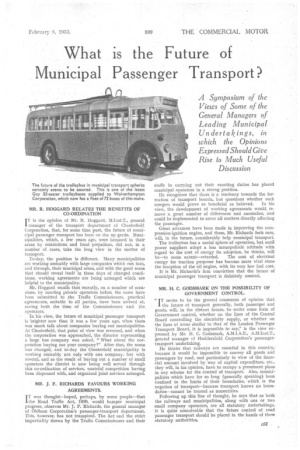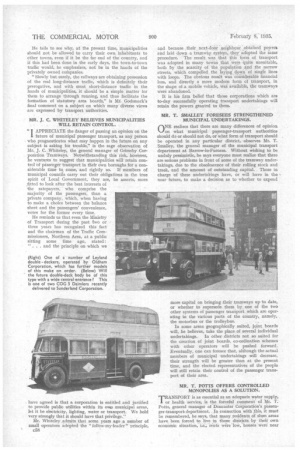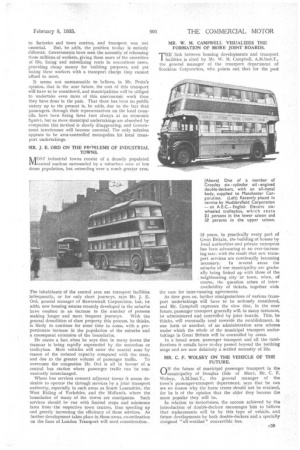What is the Future of Municipal Passenger Transport?
Page 119

Page 120

Page 121

If you've noticed an error in this article please click here to report it so we can fix it.
A Symposium of the Views of Some of the General Managers of Leading Municipal Undertakings, in which the Opinions Expressed Should Give Rise to Much Useful
Discussion
MR. R. HOGGARD RELATES 'THE BENEFITS OF CO-ORDINATION IT is the opinion of Mr. R. Hoggard, Mdrist.T., general 1 manager of the transport department of Chesterfield Corporation, that, for some time past, the future of municipal passenger transport has been on the up grade. Municipalities, which, a few years ago, were hemmed in their areas by restrictions and local .prejudices, did not, in a number of cases, take the long view in the matter of transport.
To-day, the position is different. Many municipalities arc working amicably with large companies which run into, and through, their municipal areas, and with the good sense that should reveal itself in these days of changed conditions, working agreements are being arranged which are helpful to the municipality.
Mr. Hoggard recalls that recently, on a number of occasions, by meeting private operators before the cases have been submitted to the Traffic Commissioners, practical agreements, suitable to all parties, have been arrived at, saving both the time of the Commissioners and the operators.
In his view, the future of municipal passenger transport is brighter now than it was a few years ago, when there was much talk about companies buying out municipalities. At Chesterfield, that point of view was reversed, and when the corporation was approached, the director representing a large bus company was asked, "What about the corporation buying out your company" After that, the scene was changed, and to-day the Chesterfield municipality is working amicably not only with one company. but with several, and as the result of buying out a number of small operators the district is now being well served through this co-ordination of services, wasteful competition having been dispensed with, and organized joint services arranged.
MR. J. F. RICHARDS FAVOURS WORKING AGREEMENTS.
IT was thought—hoped, perhaps, by some people—that the Road Traffic Act, 1930, would hamper municipal progress, observes Mr. 3. F. Richards, the general manager of Oldham Corporation's passenger-transport department. This, however, has not transpired. The Act and the strict impartiality shown by the Traffic Commissioners and their staffs in carrying out their exacting duties has placed municipal operators in a strong position.
He recognizes that there is a tendency towards the formation of transport boards, but questions whether such mergers would prove as beneficial as believed. In his view, the development of working agreements would, remove a great number of differences and anomalies, and could be implemented to cover all matters directly affecting the passenger.
Great advances have been made in improving the compression-ignition engine, and these, Mr. Richards feels sure, will, in the future, considerably help municipal transport.
The trolleybus has a useful sphere of operation, but until power suppliers adopt a less monopolistic attitude' with regard to the cost of energy its adoption, he thinks, will be—to some extent—retarded. The cost of electrical energy for traction purposes has become more vital since the inception of the oil engine, with its very low fuel cost.
It is Mr. Richards's firm conviction that the future of municipal passenger transport is definitely assured.
MR. H. C. GODSMARK ON THE POSSIBILITY OF GOVERNMENT CONTROL.
" IT seems to be the general consensus of opinion that the future of transport generally, both passeeger and goods, will, in the distant future, be under some form of Government control, whether on the lines of the Central Board controlling the electricity supply, or whether on the lines of areas similar to that of the London Passenger Transport Board, it is impossible to say," is the view expressed by Mr. H. C. Godsmark, A.M.I.A.E., A.M.Inst.T., genera/ manager of Huddersfield Corporation's passengertransport undertaking. He thinks that railways are essential in this country, because it would be impossible to convey all goods and passengers by road, and particularly in view of the financial amount involved by way of capital expenditure, etc., they will, in his opinion, have to occupy a prominent place in any scheme for the control of transport. Also, municipalities which have for so long (generally speaking) been confined to the limits of their boundaries, which is the negation of transport—because transport knows no boundaries—cannot be treated as nonentities.
Following up this line of thought, he says that as both the railways and municipalities, along with one or two small company operators, are all statutory undertakings, it is quite conceivable that the future control of road passenger transport should be placed in the hands of these statutory authorities. He fails to see why, at the present time, municipalities should not be allowed to carry their own inhabitants to other towns, even if it be the far end of the country, and if this had been done in the early days, the town-to-town traffic would, he emphasizes, not be in the hands of the privately owned coinpanies.
"Slowly but surely, the railways are obtaining possession of the real long-distance traffic, which is definitely their prerogative, and with most short-distance traffic in the hands of municipalities, it should be a simple matter for them to arrange through running, and thus facilitate the formation of statutory area boards," is Mr. Godsmark's final comment on a subject on which many diverse views are expressed by transport authorities.
MR. J. C. WHITELEY BELIEVES MUNICIPALITIES WILL RETAIN CONTROL.
" APPRECIATE the danger of passing an opinion on the future of municipal passenger transport, as any person who prognosticates what may happen in the future on any subject is asking for trouble," is the sage observation of Mr. j. C. Whiteley, the general manager of Grimsby Corporation Tramways. Notwithstanding this risk, however, he ventures to suggest that municipalities will retain control of passenger transport in their Own boroughs for a considerable time to, come, and rightly so. If members of municipal councils carry out their obligations in the true spirit of Local Government, they are, he asserts, more :fitted to look after the best interests of the ratepayers, who comprise the majority of the passengers, than a private company, which, when having to make a choice between the balance sheet and the passengers' convenience, votes for the former every time.
He reminds us that even the Ministry of Transport during the past Iwo or three years has recognized this fact and the chairman of the Traffic Commissioners, Northern Area, at a public sitting some time ago, stated: . . . and the principle on which we
. have agreed is that a corporation is entitled and justified to provide public utilities within. its OVVil municipal areas, let it be electricity, lighting, water or transport. We hold very strongly that it should have that privilege.''
Mr. Whiteley admits that some years ago a number of small operators adopted the " follow-my-leader " principle, c58 and because their nest door neighbour obtained powers . . .
and laid down a trame'ay system, they adopted the Same procedure. The result was that this forth of transport was adopted in many towns :that were quite unsuitable, both by the scarcity of the population and the narrow streets, which compelled the laying down of single lines with loops. The obvious result was COriSiderable financial loss, and directly a more :modern form of transport, in the shape of a mobile vehicle, as available, the tramways were abandoned.
It is his firm belief that those corporations which are to-day successfully operating transport undertakings will retain the powers granted to them.
MR. T. SMALLEY FORESEES STRENGTHENED MUNICIPAL UNDERTAKINGS.
rINE realizes that there are many differences of opinion INJon what municipal passenger-transport authorities should do or should not do, or what form of transport should be operated in any particular district, observes Mr. T. Smalley, the general manager of the municipal transport department at Barrow-in-Furness. Without wishing to be unduly pessimistic, he says everyone must realize that there are serious problems in front of some of the tramway undertakings, due to the obsolescence of their rolling stock and track, and the amount of outstanding capital. Those in charge of these undertakings have, or will have in the near future, to make a decision as to whether to expend more capital on bringing their trainways up to date, or whether to supersede them by one of the two other systems of passenger transport which arc operating in the various parts of the country, namely, the motorbus or the trolleybus.
In some areas geographically suited, joint boards will, he believes, take the place of several individual
undertakings. In other districts not so suited for the creation of joint boards, co-ordination schemes with other operators will be pushed forward. Eventually, one can foresee that, although the actual numbers of municipal undertakings will decrease, their strength will be greater than at the present time, and the elected. representatives of the people will still retain their control of the passenger transport of their area.
MR. T. POTTS OFFERS CONTROLLED MONOPOLIES AS A SOLUTION.
TRANSPORT is as essential as an adequate water supply,
1 or health service, is the forceful comment of Mr. T. Potts, general manager of Doncaster Corporations passenger-transport-department In Connection with ,this, it must be remembered, he says, that many residents, Of slum ,areas have been forced to live in those districts by their own economic situation, i.e., 'rents were low, houses were near
to factories and town centres, and transport was not essential. But, he adds, the position to-day is entirely different. Governments have seen the necessity of rehousing these millions of workers, giving them more of the amenities of life, fixing and subsidizing rents in necessitous cases, providing cheap money for building purposes, and yet facing these workers with a transport charge they cannot afford to meet.
It seems not unreasonable to believe, in Mr. Potts's opinion, that in the near future, the cost of this transport will have to be considered, and municipalities will be obliged to undertake even more of this uneconomic work than they have done in the past. That there has been no public outcry up to the present is. he adds, due to the fact that passengers. through their representatives on the local councils, have been fixing fares (not always at an economic figure), but as mote municipal undertakings are absorbed by companies this method is slowly disappearing. and Government interference will become essential. The only solution appears to be area-controlled monopolies for local transport undertakings.
MR. J. E. ORD ON THE PROBLEMS OF INDUSTRIAL TOWNS.
it ROST industrial towns consist of a densely populated IV/central nucleus surrounded by a suburban zone of less dense population, but extending over a much greater area.
The inhabitants of the central area use transport facilities infrequently, or for only short journeys. says Mr. J. E. Ord, general manager of Rawtenstall Corporation. but, he adds, new housing estates recently developed in the suburbs have resulted in an increase in the number of persons
making longer and more frequent journeys. With the general demolition of slum property this process, he thinks, is likely to continue for some time to come, with a proportionate increase in the population of the suburbs and a consequent extension of the boundaries.
He states a fact when he says that in many towns the tramcar is being rapidly superseded by the motorbus or trolleybus. More vehicles will enter the central zone by reason of the reduced capacity compared with the tram, and due to the greater volume of passenger traffic. To overcome the congestion Mr. Ord is all in favour of a central bus station where passenger traffic can be conveniently interchanged.
Where bus services connect adjacent towns it seems desirable to operate the through services by a joint transport authority, especially in such areas as South Lancashire, the West Riding of Yorkshire, and the Midlands, where the boundaries of many of the towns are contiguous. Such services should be run with limited stops and minimum fares from the respective town centres, thus speeding up and greatly increasing the efficiency of these services. As further development takes place in these areas, co-ordination on the lines of London Transport will need consideration..
MR. W. M. CAMPBELL VISUALIZES THE FORMATION OF MORE JOINT BOARDS.
THE link between housing developments and transport facilities is cited by Mr. W. M. Campbell, A.M.Inst.T., the general manager of the transport department of Stockton Corporation, who points out that for the past 15 years, in practically every part of Great Britain, the building of houses by local authorities and private enterprise has been advancing at an ever-increasing rate, with the result that new transport services are continually becoming necessary. In several areas the suburbs of one municipality are gradually being linked up with those of the neighbouring city or town, when, of course, the question arises of interavailability of tickets, together with the case for inter-running agreements.
As time goes on, further amalgamations of various transport undertakings will have to be seriously considered, and Mr. Campbell expresses the view that, in the near future, passenger transport generally will, in many instances, be administered and controlled by joint boards. This, he thinks, will eventually tend towards the establishment. in one form or another, of an administration area scheme under which the whole of the municipal transport undertakings in Great Britain will be controlled by areas. In a broad sense, passenger transport and all the ramifications it entails have to-day passed beyond the teething stage and are now definitely a settled necessity of life.
MR. C. F. WOLSEY ON THE VEHICLE OF THE FUTURE.
QN the future of municipal passenger transport in the municipality of Douglas (Isle of Man), Mr. C. L. Wolsey, A.M.Inst.T., the general manager of the town's passenger-transport department, says that he can see no reason why the horse trams should not be retained, for he is of the opinion that the older they become the more popular they will be. In relation to motorlases, the success achieved by the introduction of double-deckers encourages him to believe that replacements will be by this type of vehicle, and future developments by both double-deckers and a specialty designed " all-weather " convertible bus.














































































































































































